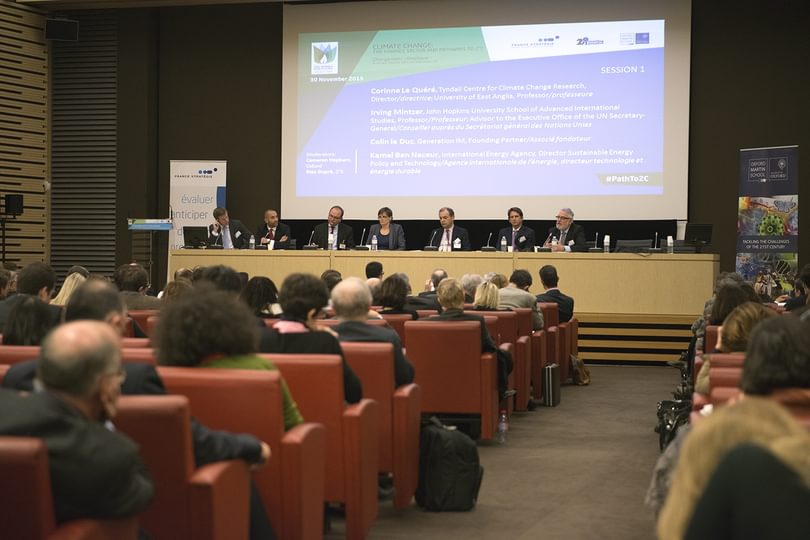
On 30 November the Oxford Martin Net Zero Carbon Initiative launched its 'Working Principles for Investment in Fossil Fuels' at a side event during the COP21 climate negotiation in Paris. The event was a key opportunity for climate scientists to engage with the financial sector and raise awareness of the need to work towards net zero carbon emissions, says James Martin Fellow Richard Millar.
“Over the last decade, our world has actually carbonised and not decarbonised, despite all the progress that has been made on technology”. Theses words, spoken by Professor Ottmar Edenhofer, Chief Economist at the Potsdam Centre for Climate Impacts Research, brought home to me, very clearly, the real scale of what world leaders are attempting to do in Paris.
The event at which these words were spoken, co-organised by the Oxford Martin Net Zero Carbon Investment Initiative and one of a number of side events being held around Paris supporting the COP21 programme, was being held in the grand surroundings of the French Assemblée nationale and brought together leaders of financial institutions with leading climate change academics, to discuss what role the financial sector and investors could or should have in driving the economic transition required to limit global warming to beneath 2°C. Whether it was the effect of the historic surroundings, or just a general sense of purpose sweeping across Paris as COP21 brings a more positive focus to the city after recent events, attendees from across the European financial world seemed to arrive at the event with a real desire to engage and learn more about this challenging topic.
As a physical climate scientist and climate economist working in the Oxford Martin Net Zero Carbon Investment Initiative, the opportunity to interact with professionals at the forefront of financial sector thinking on climate is always a hugely valuable opportunity. Other the last few months, the Initiative has been developing a set of Working Principles for Investment in Fossil Fuels that aim to fill a gap between current financial sector practices and the latest understanding of climate science within the academic community. Corinne Le Quéré, a leading carbon cycle scientist, speaking on a panel at the event, encapsulated how cutting edge climate science is challenging financial thinking: “the only difference between 2, 3 or 4 degrees of warming is the time in which emissions have to be reduced to zero, but for all levels of warming they have to be reduced to absolute zero”. Looking around the room, it was clear that this message was new for many attendees and hasn’t as of yet been widely understood in the financial sector. Whether this message has been understood in the ‘hermetically-sealed’ official negotiation centre a few miles north on the edge of Paris, is another question…
Combining this need to get to net-zero emissions with Professor Edenhofer’s observation that the global economy is getting more, not less, carbon intensive, it is hard to overstate the ultimate challenge facing governments, the financial sector and all of us in order to limit warming to 2°C. Depending on exact value of the carbon budget for 2°C of warming, the committed emissions already locked into existing energy infrastructure could be very close to its fair share of remaining cumulative emissions in order to limit warming to beneath 2°C. Thinking in terms of locked-in cumulative emissions shows that investment decisions in carbon intensive energy infrastructure today could run a real risk of either being stranded under serious climate policy or of taking the world over the 2°C threshold.
While the ultimate implications of the latest climate science may have been new to some members of the financial community, there was a clear desire to engage with what the science implies for their business activities. Colin le Duc, founding partner of Generation IM, a leading long-term investment partnership and speaking at the Paris event, recognised that the challenge of reaching net zero required “a fundamental retooling of our economy for the 21st century across all sectors”. Myriam Durand, of Moody’s France, spoke about how credit ratings agencies were actively looking for robust information on companies in order to assess climate-related risks over a range of timescales.
Providing the tools, directly connected to the climate science, is what the 'Working Principles' of the Oxford Martin Net Zero Carbon Investment Initiative is all about. Our principles focus on three main areas: firstly the need for companies to accept that the carbon content of their business activity must ultimately fall to zero in order to be consistent with a stable climate, secondly a need for companies to offer forward looking strategy-based disclosures on their plan to limit cumulative emissions and transition to net-zero, and finally a set of meaningful metrics and milestones by which to measure the company’s progress towards this goal.
Whilst it is clear that without substantial policy action from the COP21 negotiators the financial sector won’t produce the solution to climate change on its own, ethical investors and investment tools are achieving ever greater prominence. The global divestment movement, spearheaded by 350.org, has led the call for climate-conscious investors to align their investment activities with their desire for a stable climate. It is already clear from many discussions in Paris that this pressure is starting to result in a raised awareness of carbon related risk on institutional radars from across the mainstream financial spectrum.
Whilst, come success or failure, the COP21 negotiations will conclude at the end of this week, the conversation on how to implement the transition required to meet the COP21 pledges across the economy is just beginning. We hope that our Working Principles can add a valuable, and thus far missing, contribution from the long-term science of climate stabilisation to the carbon investment conversation.
This opinion piece reflects the views of the author, and does not necessarily reflect the position of the Oxford Martin School or the University of Oxford. Any errors or omissions are those of the author.
